Are Microsoft Teams notifications not working or showing up on your Windows PC? Several Teams users have reported that they are not receiving any notifications for chat, calls, mentions, and other Teams’ new activities on their computers. The issue happens even when the notifications are enabled in Teams.
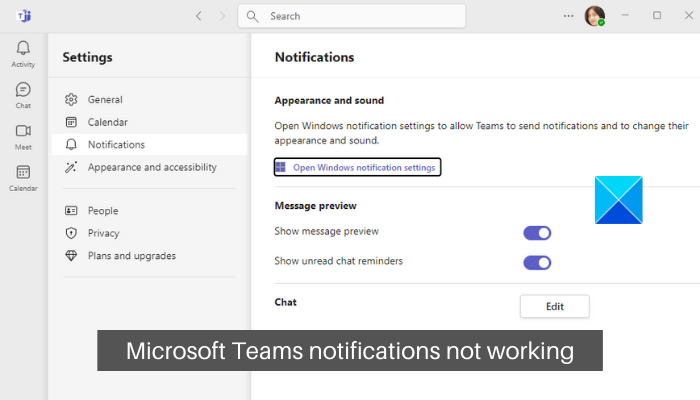
Microsoft Teams sends you desktop notifications for new posts, chats, mentions, calls, and other activities. Whenever someone mentions you in a conversation or someone sends a private chat, you will get a notification for the same. Similarly, you get other notifications to stay up-to-date and not miss out on important activities. However, for some users, the desktop notifications for Teams are not working.
There can be different reasons why you are not getting Teams notifications on your PC. It might be due to fluctuating internet connection, a Teams account glitch, your Teams status, or outdated Teams app. Your Windows settings can also lead to this issue. For example, if you have enabled Focus Assist or Battery Saver mode, the Teams notifications might not show up. This issue can also be caused because of corrupted Microsoft Teams cache.
When you first experience this issue, we recommend you restart the app or PC and then check if the problem is gone. And also, launch Teams at the Windows Startup. For that, open Task Manager, go to the Startup apps tab, select Microsoft Teams, and then choose Enable option. See if that helps in resolving the issue at hand. If not, we have multiple working fixes that you can use to resolve the Microsoft Teams notifications not working issue.
Microsoft Teams notifications not working in Windows 11/10
Here are the methods you can use if Microsoft Teams desktop notifications are not showing up or working on your Windows 11/10 PC:
- Check your Microsoft Teams notification settings.
- Make sure your internet connection is stable.
- Check Teams server status.
- Log out from Microsoft Teams, then log in again.
- Reset Availability Status.
- Ensure that Microsoft Teams is up-to-date.
- Disable Focus Assist.
- Turn off Battery Saver.
- Enable Teams Notifications for a Channel.
- Clear Microsoft Teams Cache.
1] Check your Microsoft Teams notification settings
First of all, you need to make sure that you have turned on desktop notifications for Microsoft Teams on your PC. It might be the case that you previously disabled desktop notifications that you forgot. Hence, you can enable Teams notifications using the below steps:
- First, open Microsoft Teams and click on the Settings and more button present next to your profile icon.
- Now, go to the Settings > Notifications tab and enable the notifications as per your preference.
- Next, press the Open Windows notification settings button. You will be navigated to the Windows Notification Settings page.
- After that, make sure you have enabled notifications for Microsoft Teams.
- Once done, restart Teams and check if you are getting desktop notifications for new Teams activities or not.
If your Windows and Teams notification settings are fine, you can apply the next fix to resolve it.
2] Make sure your internet connection is stable
Sometimes, a sloppy internet connection can mess up your desktop notifications. The notifications might show up late or might not even show up at all. Hence, you need to make sure that your internet connection is stable and that there is no internet connectivity issue. If your internet is at fault, try troubleshooting WiFi issues or switch to a different network connection.
See: Microsoft Teams keeps spinning, loading, or putting on hold.
3] Check Teams server status
This issue might be caused if certain Teams services are down at the moment. Hence, do check the server status of Microsoft Teams and make sure its services are up and running.
4] Log out from Microsoft Teams, then log in again
You might not be receiving desktop notifications for Teams due to a minor account glitch. Hence, if the scenario is applicable, you can log out of your account and then log in back into Teams to check if the problem is resolved. To do that, click on your profile icon from the top and then choose the Sign out option. After that, restart Teams and then enter your login credentials to sign in back.
If the problem is still the same, use the next fix.
5] Reset Availability Status
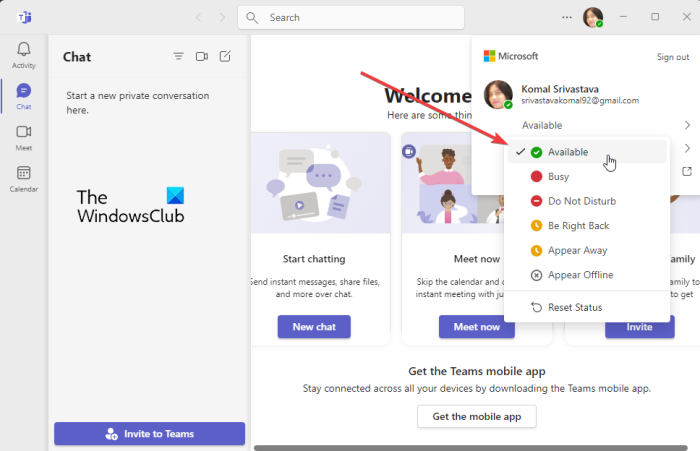
If your Teams status is set to Busy or Do Not Disturb, the notifications might not work. Hence, reset your status on Microsoft Teams to Available and then see if the problem is resolved. Here’s how you can do that:
- First, open Microsoft Teams and click on your profile icon.
- After that, tap on your current status, and then from the appeared statuses, choose the Available option.
- Once done, check if the desktop notifications for Teams are working fine or not.
Read: Audio cuts off automatically during a call in Microsoft Teams.
6] Ensure that Microsoft Teams is up-to-date
If your Microsoft Teams app is outdated, you might face issues like this. New updates introduce new features as well as fix previous bugs and issues. Hence, always keep your app up-to-date to avoid problems like this.
To update Microsoft Teams, open the app and press the Settings and more menu button present next to your profile icon. After that, select the Check for updates option and it will start looking for available updates. If available, Teams will be updated and restarted. Once done, you can check if you are receiving desktop updates for Teams or not.
7] Disable Focus Assist
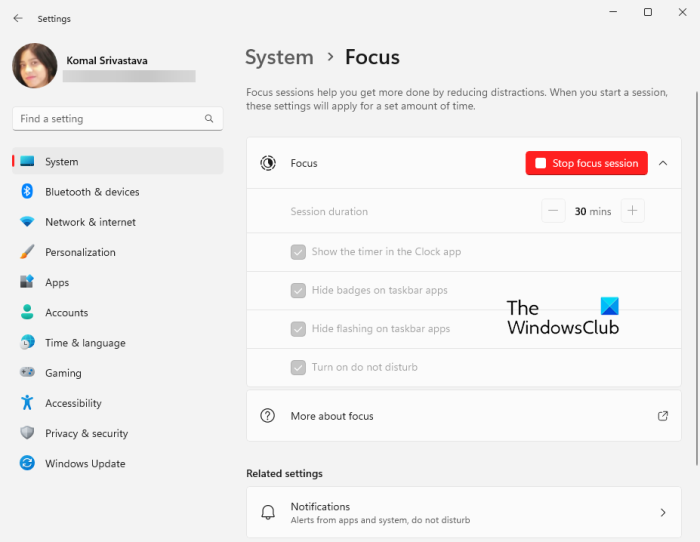
It might be the case that you have enabled the Focus Assist feature on your computer. Focus Assist is used to disable distracting notifications while focusing on your important tasks on Windows 11/10. It was previously known as quiet hours in previous Windows versions. In case you have enabled this feature, you won’t be getting any notifications including Teams. Hence, disable the Focus Assist feature to get Teams notifications.
Here are the steps to turn off Focus Assist on Windows 11/10:
- Firstly, press Win+I to launch the Settings app.
- Now, move to the System > Focus option.
- Next, click on the Stop focus session button to end the session.
- If you want to add an exception for Microsoft Teams during the focus session, click on the Notifications option under the Related settings section.
- After that, choose the Set priority notifications option and then tap on the Add apps option on the next page.
- Now, choose the Microsoft Teams app to add it to the priority notifications list.
- Finally, check if you are getting the new Teams notifications or not.
See: Video sharing is disabled by the administrator in Microsoft Teams.
8] Turn off Battery Saver
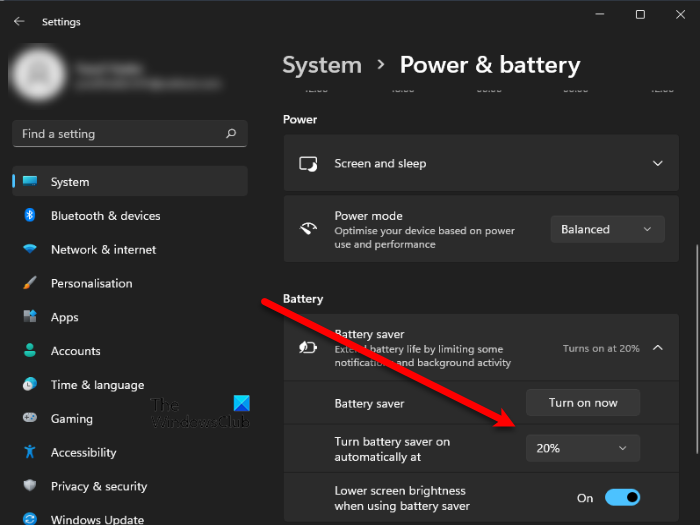
If you have enabled the Battery Saver feature on your Windows PC, it will prevent Teams from sending notifications. The Battery Saver feature is used to save power by disabling background notifications and some other tasks. Hence, if the scenario applies, disable Battery Saver to fix the issue. Here’s how you can do that:
- First, open your Settings app and navigate to the System > Power & battery option.
- Now, click on the Battery saver option and tap on the Turn off now button.
You should now be able to get the latest Teams notifications. However, if you still face the same issue, we have a few more fixes that should resolve the problem for you.
9] Enable Teams Notifications for a Channel
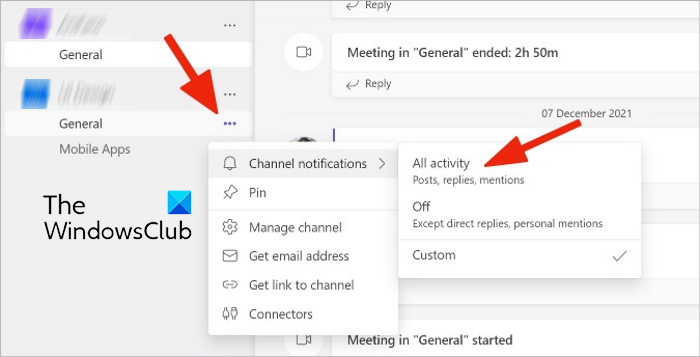
Are you experiencing this problem with a particular channel on Teams? If yes, the issue might be caused if you haven’t configured the channel properly. Hence, customize that specific channel and enable notifications for it. Here are the steps to do that:
- First, open Teams and tap on the down arrow button present next to a team.
- Now, press the right-click on the channel with which you are facing the issue at hand.
- After that, go to the Channel notifications menu and select the All activity option.
- If you want to enable specific notifications, select the Custom option and then turn on the notifications that you would like to receive.
Read: Microphone not working in Microsoft Teams on Windows
10] Clear Microsoft Teams Cache
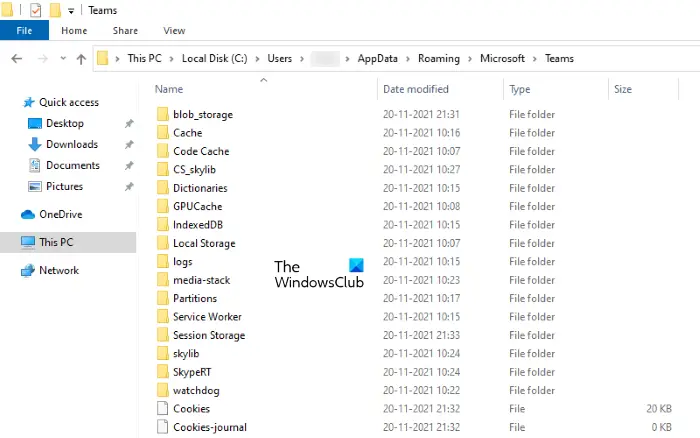
If none of the above solutions worked for you, try deleting Microsoft Teams’ cache. This issue could very well be facilitated due to the corrupted cache associated with the Teams app. Hence, clear the Teams cache and then check if the problem is resolved. Here are the steps to do that:
- First of all, close the Microsoft Teams app.
- Now, evoke the Run command box using Win+R.
- In the Open box, type %AppData%\Microsoft\Teams and press the Enter button.
- You will be navigated to the temporary data location of Teams in File Explorer. Here, select all files and folders using Ctrl+A and press the Delete button.
- Once you are done clearing Teams cache, restart the app and check if the issue is resolved or not.
In case you are experiencing this issue while using the web version of Teams in Chrome, Firefox, or some other web browser, clear the browser cache to fix the issue.